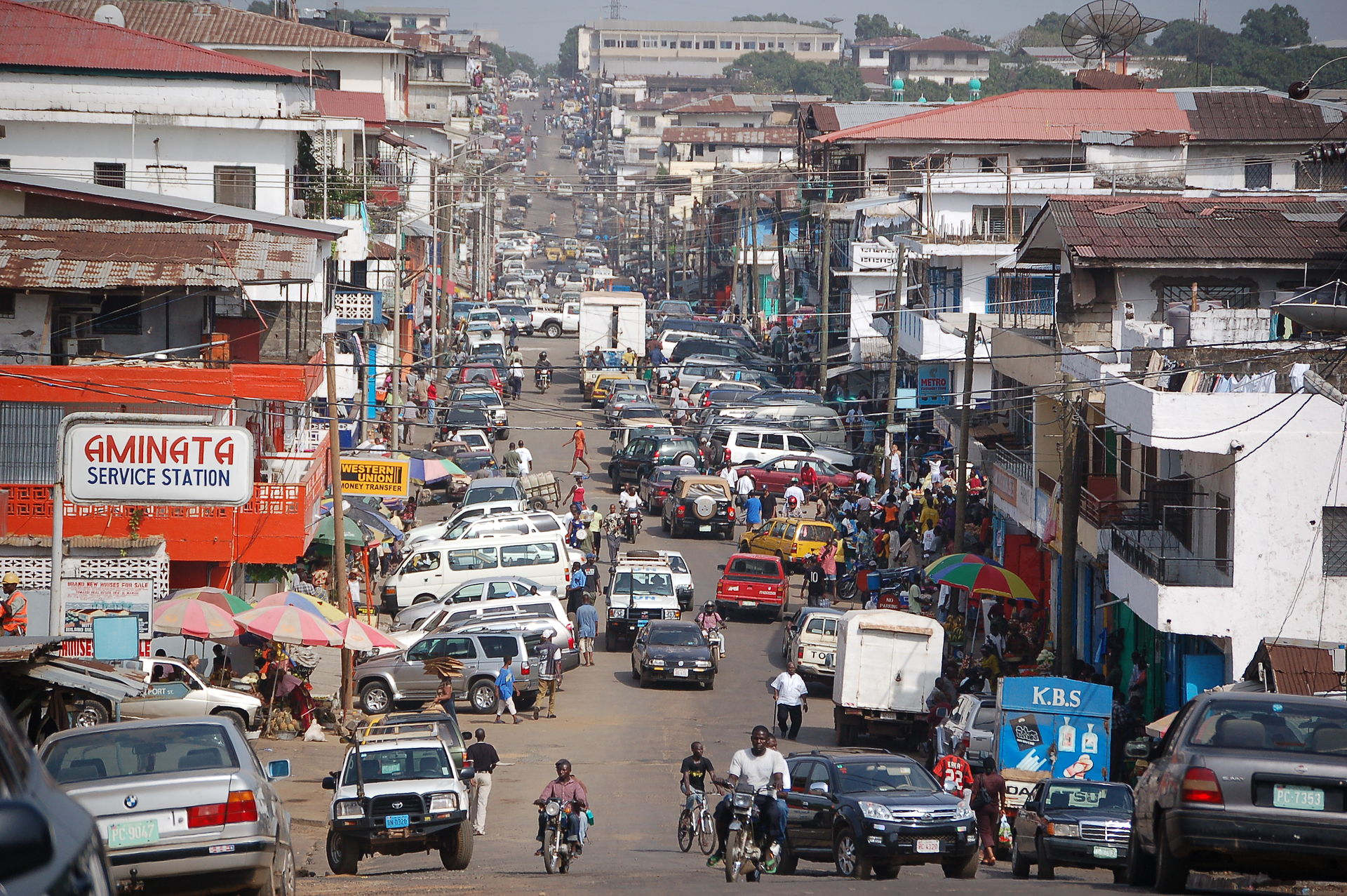Liberia: human rights progress and challenges
This country spotlight is based on data published in 2020 on our Rights Tracker. You can read further about our research credentials and our methodology.
Call for action on human rights in Liberia
In the United Nations Human Rights Committee’s initial report of Liberia in 2018, the Committee noted that 2017 marked Liberia’s first peaceful and independent transition of power from the administration of Ellen Johnson-Sirleaf to President George Manneh Weah since the second Liberian Civil War ended in 2003.
Fulfilling his election promise to respect the right to freedom of the press, President Weah has helped repeal harsh anti-media laws while promoting legislation that aims to foster a freer media environment.
However, Reporters Without Borders highlighted a ‘surge in attacks on critical journalists and media’ as a main concern threatening the right to freedom of opinion and expression in Liberia in 2019. Additionally, in May of 2019, the Liberian minister of state for presidential affairs, Nathaniel McGill targeted the radio station Roots 102.7 FM and the station’s hosts, Henry Costa and Fidel Saydee, slapping the station with a $500,000 defamation law suit. The Committee to Protect Journalists commented that « civil defamation lawsuits involving massive claims for damages remain a major challenge to press freedom in Liberia. »
In August 2020, nine human rights groups called on the Liberian government to protect human rights defenders from threats by members of security services, and combat impunity.
What do HRMI’s data show?
Below is an overview of HRMI’s human rights report for Liberia, as seen on our Rights Tracker
Liberia scored 4.5/10 for empowerment rights, 6.5/10 for safety from the state, and 54.1% for quality of life rights.
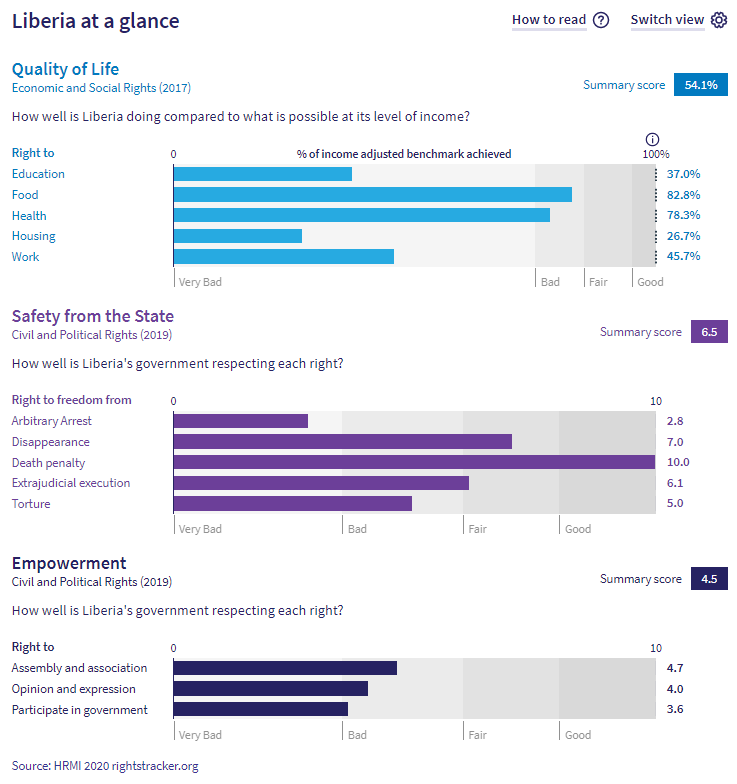
HRMI’s scores show that Liberia has room for improvement in all three human rights areas that we measure, including sharp declines in several areas.
Civil and Political Rights
To produce the civil and political rights scores, HRMI gathers information using an expert opinion survey designed to collect an unvarnished appraisal of human rights practices in the countries sampled. Our team then uses advanced statistical techniques to combine responses, producing scores that are comparable across countries. The scores highlighted in this article are based on respondents’ answers about the year 2018.
You can read further about our research credentials and our methodology
Empowerment Rights
The individual scores for freedom of speech, assembly and association, and the right to participate in government are shown in the graph below. The scores (the dark line in the middle of each bar) are shown within uncertainty bands, to show the range of likely scores. The wider the band, the less certain we are of the score, because of a low number of survey respondents, or the wide range of answers they gave, or both. The narrower the band, the more certain we are of the score. For example, the score of 4.0 for the right to opinion and expression could be between 3.2 and 4.9, which falls in the very bad to bad range.
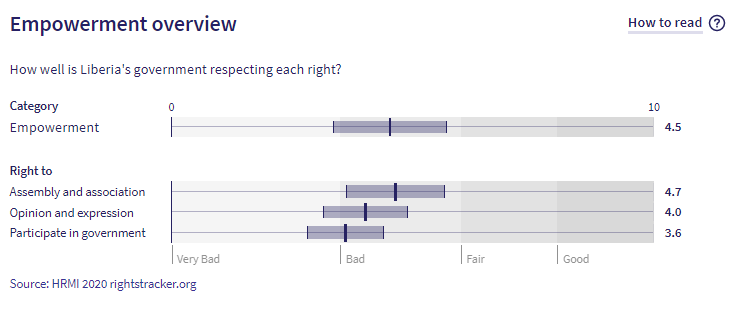
Liberia’s Empowerment score of 4.5 suggests that many people are not enjoying their civil liberties and political freedoms.
For the civil and political rights we do not have data for enough countries in Sub-Saharan Africa to do a regional comparison. However, compared to the other 28 countries in our sample, Liberia is performing worse than average on empowerment rights.
Liberia’s empowerment rights scores have sharply declined from 8.6/10 in 2017, as shown in this over time graph:
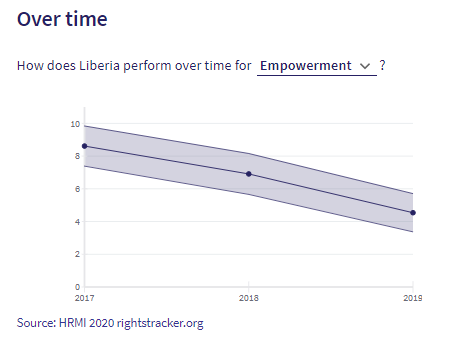
Right to assembly and association
Liberia scored 4.7/10 for the right to freedom of assembly and association.
We asked our expert survey respondents which groups of people they thought were at risk of having each right violated. The following word cloud represents their answers for the right to assembly and association.
Note: The larger the text, the greater the number of human rights experts who identified that group as at risk.
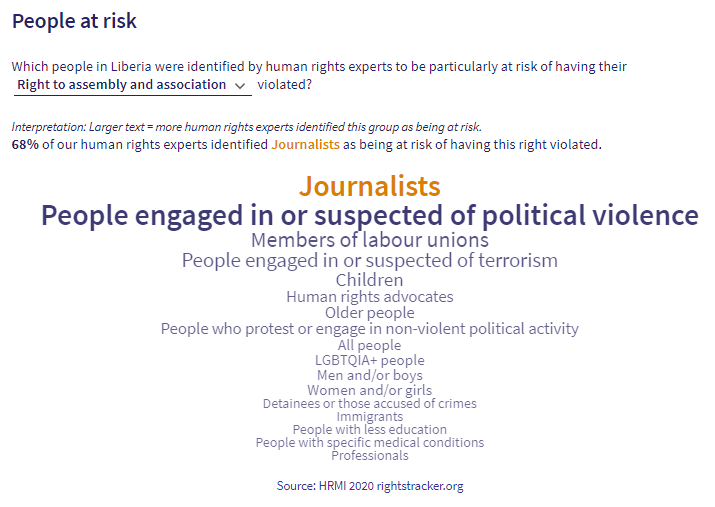
This word cloud shows that 68% of our human rights experts identified journalists and people engaged or suspected of political violence as being particularly at risk of having their right to assembly and association violated.
The next three groups most commonly identified by our experts as at risk of having their right to assembly and association violated are:
- Members of labour unions (37% of our respondents)
- People engaged in or suspected of terrorism (32%)
- Children (26%)
As reported by the Committee to Protect Journalists, the right to assembly and association was directly threatened in June of 2019, when social media services were suspended during protests in Monrovia, Liberia.
Right to opinion and expression
Liberia scored 4/10 on the right to opinion and expression.
Our experts identified the following people as being particularly at risk of having their right to opinion and expression violated:
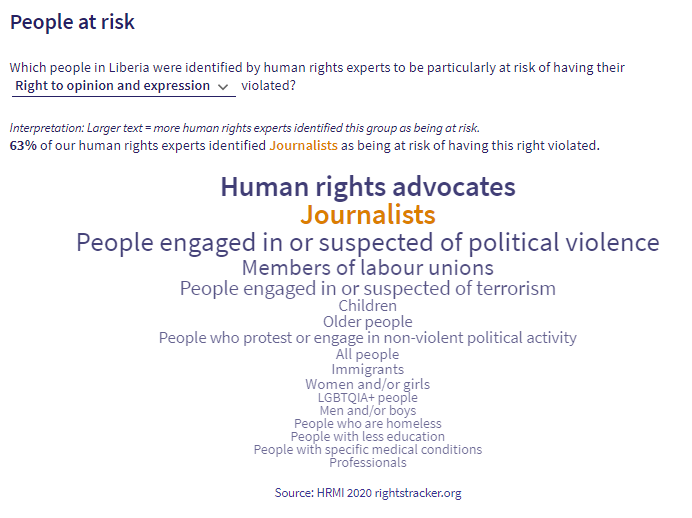
Experts again showed concern for journalists’ rights, with 63% identifying human rights advocates and journalists as being at risk of having their right to opinion and expression violated.
These figures in particular raise serious concerns about the ability of citizens to freely disseminate and access information.
Reporters Without Borders ranked Liberia 95th in the world out of 180 nations in its World Press Freedom Index, citing ‘many verbal and physical attacks on media personnel, with the result that the Press Union of Liberia wrote an open letter to the UN secretary-general voicing alarm about the rapid rise in official intolerance for independent journalism and dissent.’ The report highlighted attacks on the staff of the newspaper, Frontpage Africa, in 2018.
Right to participate in government
Liberia scores 3.6/10 for the right to participate in government, which places them in the bottom quarter of the 30 countries we have data on for this right.
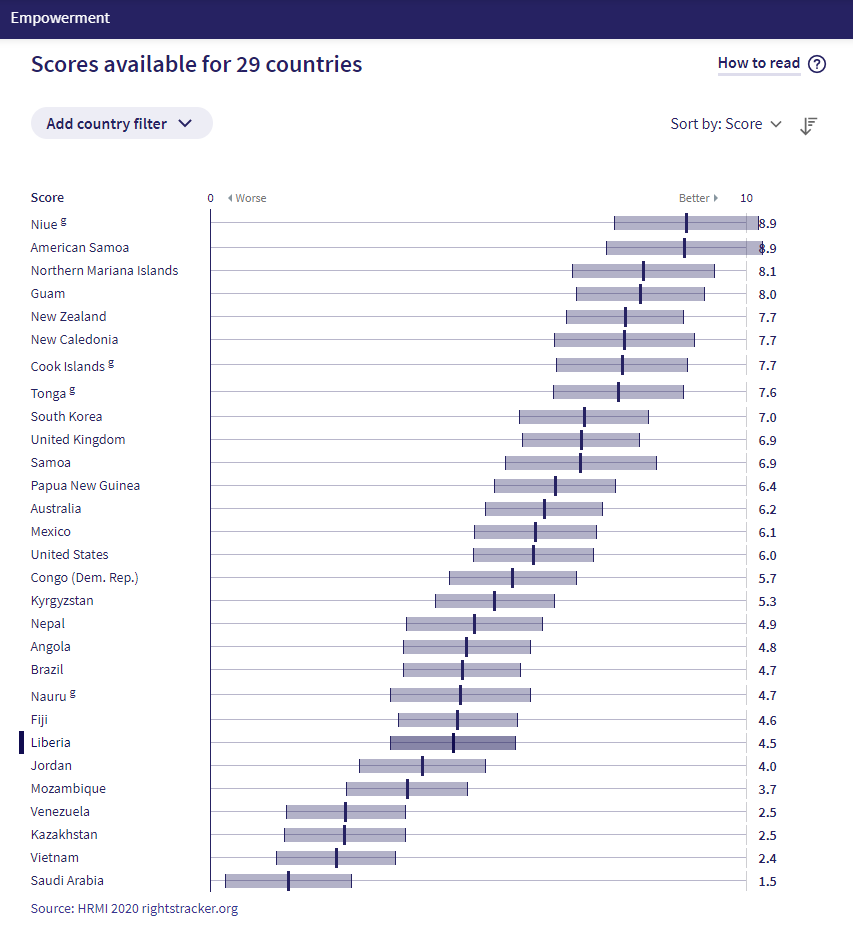
Safety from the state
HRMI’s ‘Safety from the State’ category measures physical integrity rights.
Liberia’s Safety from the State score of 6.5/10 suggests that a significant number of people are not safe from one or more of the following: arbitrary arrest, torture, disappearance, or extrajudicial killing.
The individual scores are as follows:
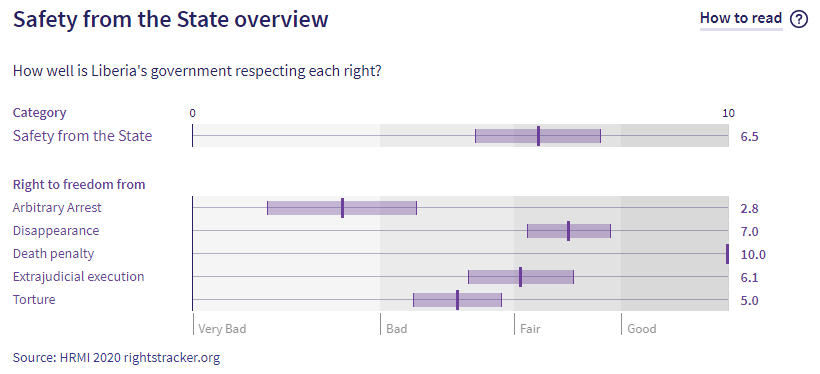
These scores suggest a need for improvement in respect for all four of these rights.
Freedom from arbitrary arrest
Freedom from arbitrary arrest scored particularly poorly, at 2.8/10.
These are the people identified as being especially vulnerable to arbitrary or political arrest and detention by government agents in 2019:
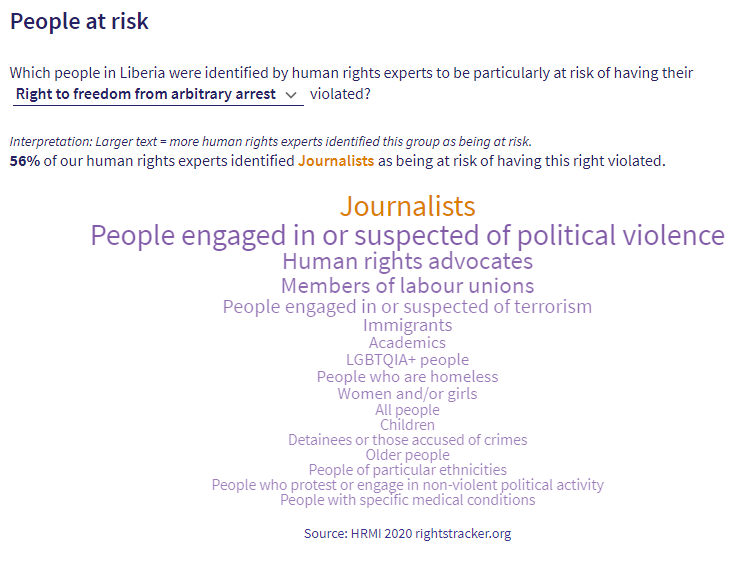
Journalists and people engaged in or suspected of political violence were identified by 56% of human rights experts as being at particular risk of arbitrary arrest.
Further, 39% of our human rights experts identified human rights advocates, and 33% identified members of labour unions, as being at risk of having this right violated.
Freedom from torture
Liberia scored 5.0/10 for the right to freedom from torture.
As shown in this word cloud, human rights experts identified journalists, human rights advocates, and people engaged in or suspected of political violence as being at particular risk of having the right to freedom from torture violated.
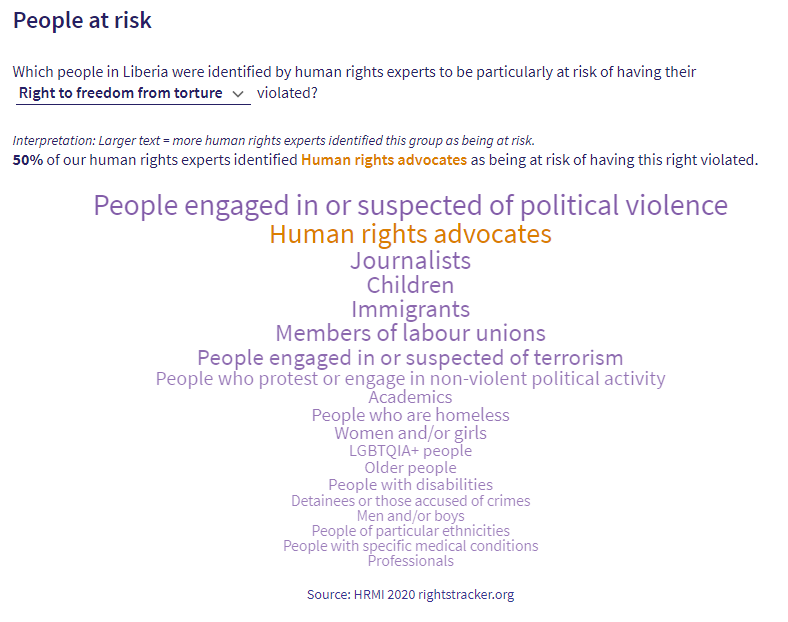
Children, immigrants, and members of labour unions were all identified by 39% of our expert survey respondents as being vulnerable to torture and ill-treatment by government agents in 2019.
Quality of Life rights
Quality of Life rights (economic and social rights) include the rights to food, health, education, housing, and work.
HRMI produces two Quality of Life scores for each country, each score measuring against a different benchmark.
The global best benchmark scores all countries against the same high standard.
By adjusting for a country’s income, HRMI also scores countries against the level they could be expected to be performing at, given their income level.
In the graphs below, we show the scores based on each of the two benchmarks, first the income adjusted, then the global best:
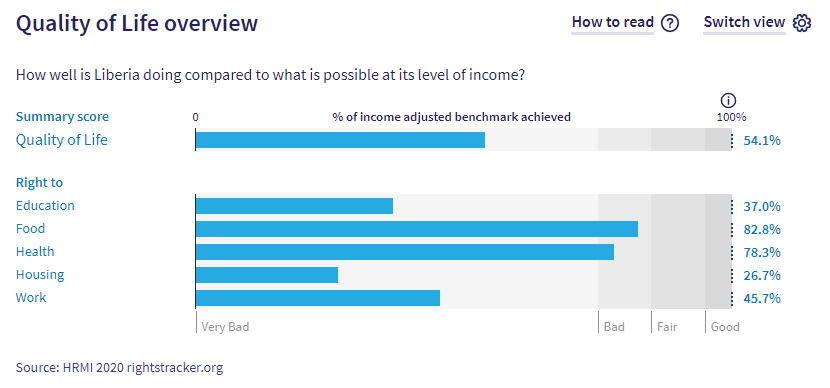
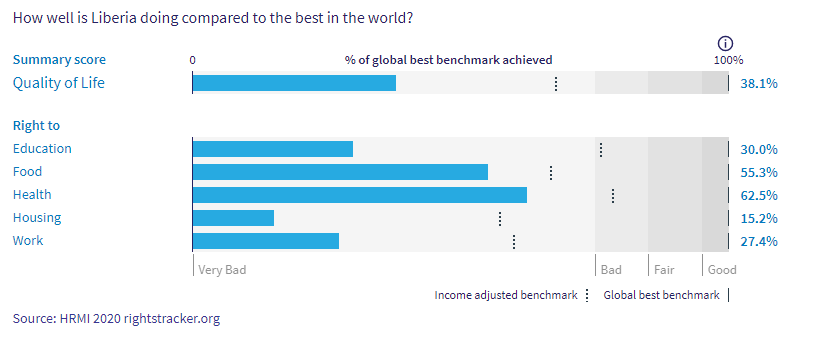
Liberia’s quality of life summary score is 54.1% when scored against the ‘income adjusted’ benchmark. This score takes into account Liberia’s resources and how well it is using them to make sure its people’s quality of life rights are fulfilled. But this drops to 38.1% when we measure Liberia against the best in the world, showing just how far the country is from ensuring its people can really flourish. Liberia will of course need increased resources to reach the global best benchmark.
The income adjusted score tells us that Liberia is only doing 54.1% of what should be possible right now with the resources it has. Since anything less than 100% indicates that a country is not meeting its current duty under international human rights law, our assessment is that Liberia has a long way to go even to meet its immediate economic and social rights duty.
Right to education
Liberia’s second lowest quality of life score is for the right to education, at 37%. This score falls in the very bad range. Liberia can do a lot better even without growing its economy.
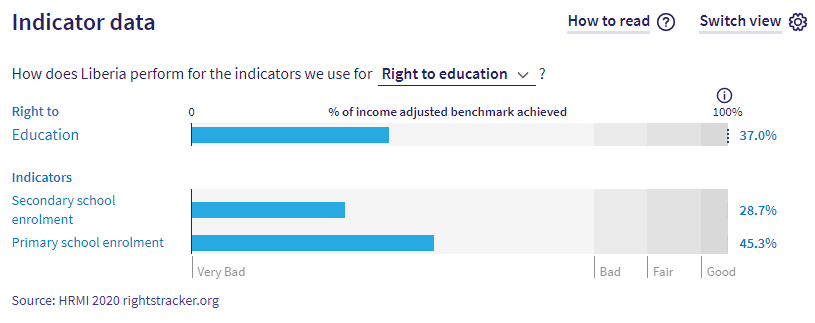
These are the people that our experts identified as at risk of having their right to education violated:
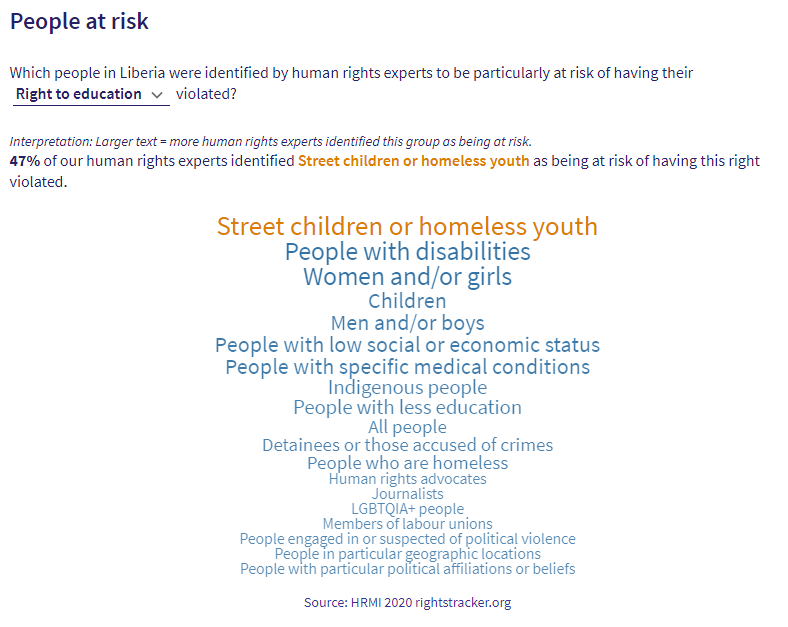
47% of human rights experts identified street children or homeless youth as being at particular risk of having their right to education violated.
The next most commonly identified groups by our experts as at risk of having their right to education violated are as follows:
- People with disabilities (41%)
- Women and/or girls (41%)
- Children (29%)
- Men and/or boys (29%)
- People with low social or economic status (29%)
- People with specific medical conditions (29%)
Leaders in Liberia need to pay attention to these groups whose right to education is not currently being met.
Right to housing
The country’s lowest quality of life score is the right to housing, at 26.7%.
These are the people our experts identified as at risk of having their right to housing violated:
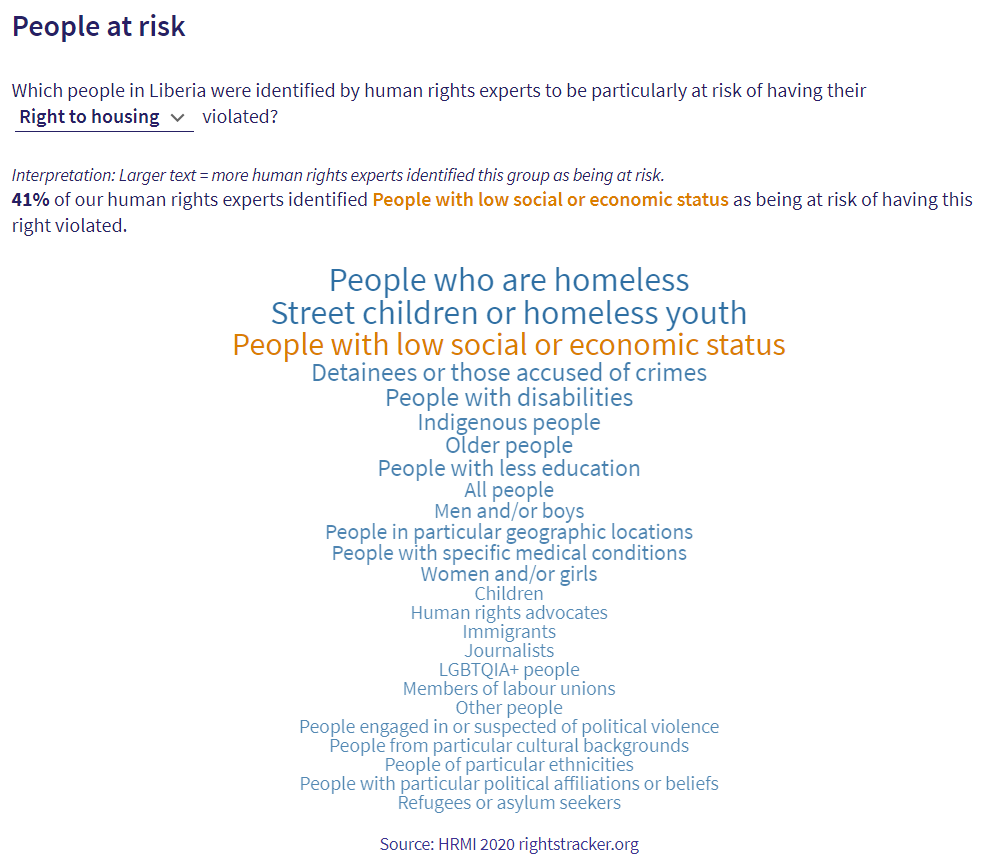
47% of our experts identified people who are homeless, and street children or homeless youth as being at risk of having their right to housing violated in Liberia.
The next most commonly identified groups by our experts as at risk of having their right to housing violated are as follows:
- People with low social and economic status (41%)
- Detainees or those accused of crimes (24%)
- People with disabilities (24%)
Moving forward, it is important that leaders in Liberia work to fulfill the right to housing for these most commonly identified groups.
Summary of Liberia’s human rights performance
Overall, our data show that Liberia has some way to go before its citizens are able to fully enjoy their civil and political rights.
There are several groups of people who were consistently identified by high numbers of our experts as being at risk of having these rights violated, including journalists, human rights advocates, people with particular affiliations and beliefs, and detainees or those accused of crimes.
Our data also show that with the exception of the right to food, Liberia is not meeting its quality of life rights obligations under international law, and is performing particularly poorly in fulfilling the right to housing and education. People with disabilities were most often cited by our experts as being at risk of of having both these rights violated.
While Liberia has made some headway in respecting its citizen’s physical integrity rights, whether the country will improve in its respect of empowerment rights, particularly the right to opinion and expression, remains unclear. This follows from reports from the Committee to Protect Journalists of attacks against radio transmitters in early 2019 as well as disrupted internet and social media services during protests in June of 2019. The threats against human rights defenders in 2020 put the whole country at further risk, and need to be addressed.
Compared to the other 29 countries in our 2020 sample, Liberia is performing worse than average on empowerment rights and close to average on the right to be safe from the state.
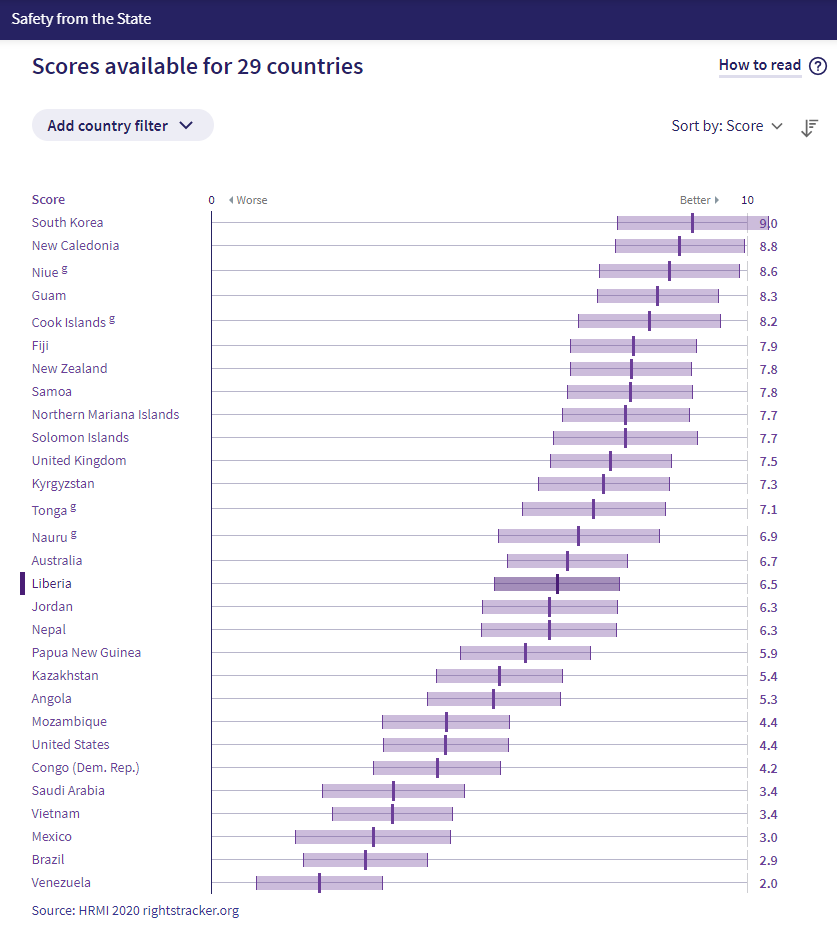
On Quality of Life, Liberia is performing close to average, compared with the other countries in Sub-Saharan Africa.
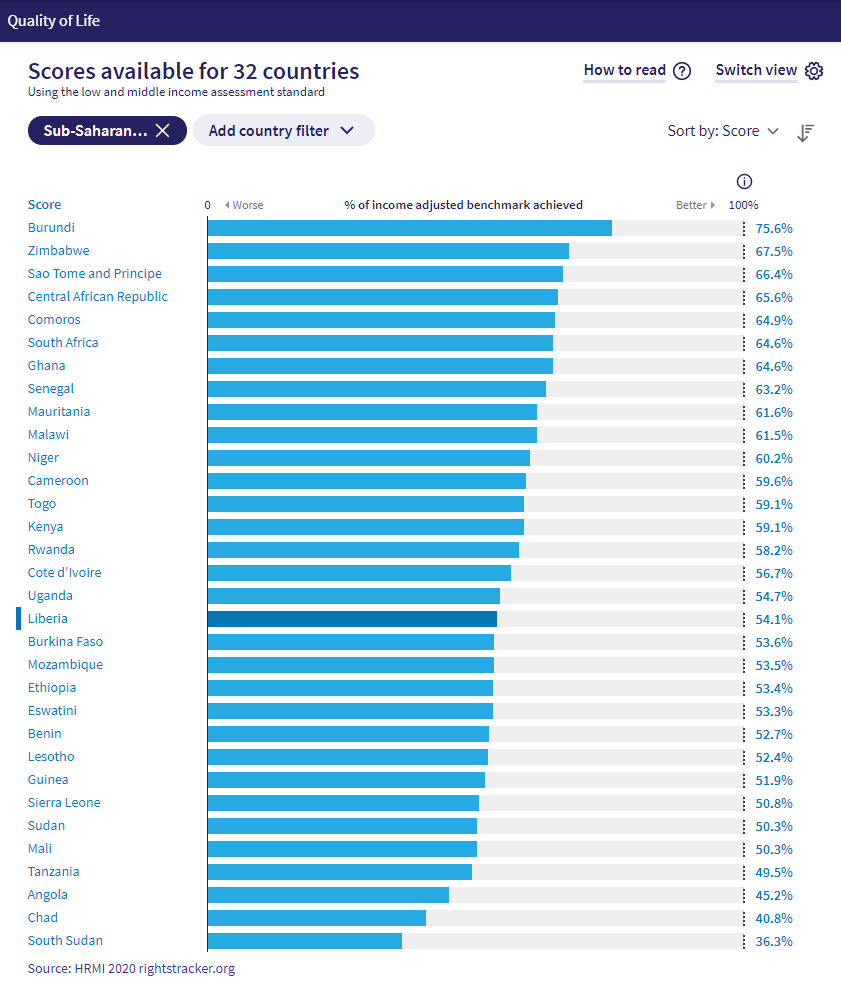
You can see further country comparisons on our Rights Tracker.
Thanks for your interest in HRMI. To further explore our human rights data for Liberia, please visit our Rights Tracker, where you can find data by country or right.


